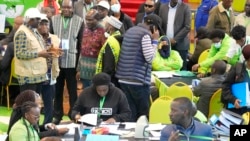Kenya’s tightly contested presidential election led to growing tensions between supporters of the two main candidates William Ruto the president-elect and Raila Odinga. Experts say claims of election fraud are likely to see the results challenged in court.
The losers of last week’s presidential election and any Kenyan citizen have seven days to file their petition at the Supreme Court.
The electoral commission chair announced William Ruto as the winner of last week’s presidential vote. He garnered 50.49% of the vote his main challenger Raila Odinga got 48.85%.
Odinga’s chief returning officer disagreed with the results and claimed their win was stolen.
It’s unclear whether Odinga will challenge the results at the Supreme Court, but the country’s law allows Kenyans to challenge the results and file their own petition.
Omwanza Ombati, an electoral law expert, says those who oppose the win can ask the court for directions and must be aware there is a limited time.
“The orders that are available for grant by the court are scrutiny and recount and also to nullify the return of William Ruto, president-elect. [It] is a very narrow petition in terms of what you can seek,” he said.
In Kenya, the petitioners have seven days to file their case at the Supreme Court, and the respondents have four days to answer those allegations. The court is required to make a ruling in two weeks.
Political commentator Martin Andati says the commission had its own flaws and some of the irregularities witnessed in the process will be laid out.
“The process has been fairly open," he said. "There have been challenges, attempts to infiltrate the system, there have been claims of numbers being padded, there have been claims in some places you will hear some numbers they were supposed to be 10,000 but declared 1,000. So, those kinds of allegations will definitely come up and arise at the Supreme Court. So, the people who have the power and the mandate to resolve those issues are the Supreme Court.”
In 2017, the Supreme Court nullified the presidential results after a successful petition by Odinga.
There were protests and celebrations after the announcement of the presidential results.
There was also chaos at the electoral commission tallying center when the chief was about to announce the winner of the election. The election split the commission in four, disagreeing with the presidential results called out by the electoral chief.
Ombati says the division of the commission does not have a huge impact in terms of the law but damages the electoral body’s credibility and reputation.
“The presidential returning officer is the chairperson of the commission, and that sole responsibility is not shared among other commissioners. So, it’s him who makes the decision in terms of return, it’s him who signs the certificate of the winner. In terms of the split going by our history, it creates doubts in large parts of the population about what went on, remembering this was an election that was evenly split across the country. So, I think it aggravates the situation for those who do not believe in their loss,” he said.
Some observers say the electoral dispute and the division at the electoral agency have taken away from the gains Kenya made in its electoral reforms after the post-election violence of 2007-08, which led to deaths, displacement and inter-communal fighting.
The international observers have urged those aggrieved with the process to take the legal route and called on political leaders to calm their supporters as the process concludes.








